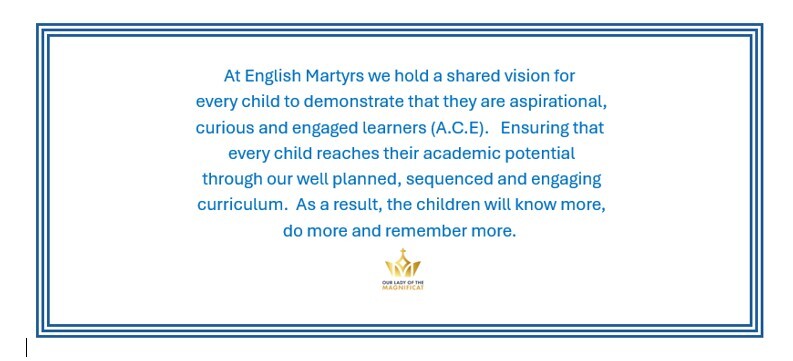- Home
- Curriculum
- Subject Information
- History
History

What does this look like in History?
At English Martyrs’ we adopt an enquiry focused approach to learning and teaching in History, which develops our pupils as young historians. Through enquiry, our pupils not only build subject knowledge and understanding but become increasingly adept at critical thinking resulting in them knowing more, doing more and remembering more.
Curriculum Intent:
At English Martyrs we follow the National Curriculum. Staff have collaborated to build a bespoke aspirational curriculum where History works alongside Geography in our Humanities curriculum to provide a basis for themed work that engages children.
In EYFS, History is planned through stories, songs, planned activities and opportunities for exploration through the Continuous Provision, linked to the half termly topics. History is part of the Understanding the World area of learning using Birth to 5 Matters Development Matters as guidance alongside the Early Years Foundation Stage Profile.
History works alongside Geography in our Humanities curriculum to provide a basis for themed work.
Our approach to History is through enquiry, using and evaluating a range of historical sources. We encourage children to ask questions, with the aim of developing engaged, motivated, aspirational and curious learners that can reflect on the past and make meaningful links to the present day.
Curriculum Implementation:
Each lesson focusses on a manageable step of new learning based on the National Curriculum.
What a typical lesson looks like:
Flashback: an opportunity for pupils to retrieve and build upon previously acquired skills, through a ‘Last Lesson, Last Unit, Last Year, Challenge’ approach.
Teach it: introduction to new learning with live modelling and explicit addressing of potential misconceptions.
Practise it: Children are given the opportunity to practise and use new skills. Learning can be independent and collaborative, all pupils participate through active learning strategies.
Prove it: Children apply new knowledge and skills. They make choices, explain ideas, select, categorise, classify information, interpret and investigate problems, evaluate, justify and hypothesise giving reasons for their ideas.
Dig deeper: To ensure all children are appropriately challenged, the skills ladder is used to enable all children to move forward and make progress at their level.
Our history curriculum is sequenced to ensure that pupils can build on previous knowledge and understanding as they tackle more complex and demanding enquiries.
Our history curriculum is mainly organised chronologically. Whenever possible, we link the Geography and History teaching to provide a fuller understanding of the people and communities involved.
We structure learning in History through big question led enquiries about relevant historical topics, people and themes. Our curriculum is therefore ‘knowledge rich’ rather than content heavy, providing time and opportunities for pupils to master and apply critical thinking skills and achieve more challenging subject outcomes.
Assessment
Termly data drop on Bromcom is informed by on-going formative assessments within every lesson through questioning, live marking with instant feedback, quizzes, and end of unit assessments as required.
Curriculum Impact:
Our history curriculum is inclusive in terms of delivering the same curriculum to all of our pupils irrespective of specific learning needs or disabilities and adapting where necessary through, for example, in class support, providing different learning environments, alternative learning activities and assessment outcomes to enable all learners to be engaged in their learning.
Monitoring, Evaluation and Review
English Martyrs’ implement a systematic approach to Monitoring, Evaluation and Review in Maths which comprises of the following:
- Learning walks and informal lesson observations
- Book looks
- Pupil voice interviews/surveys
- Data analysis and pupil progress meetings